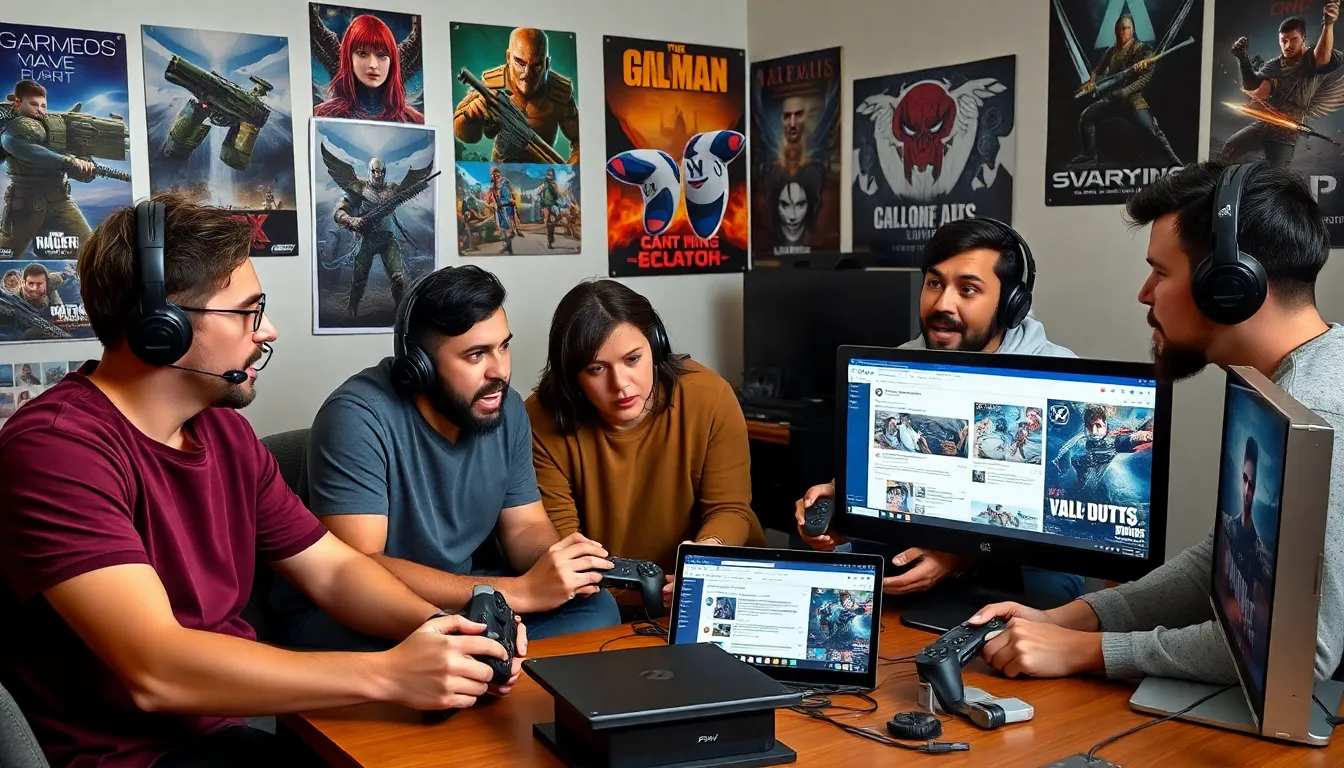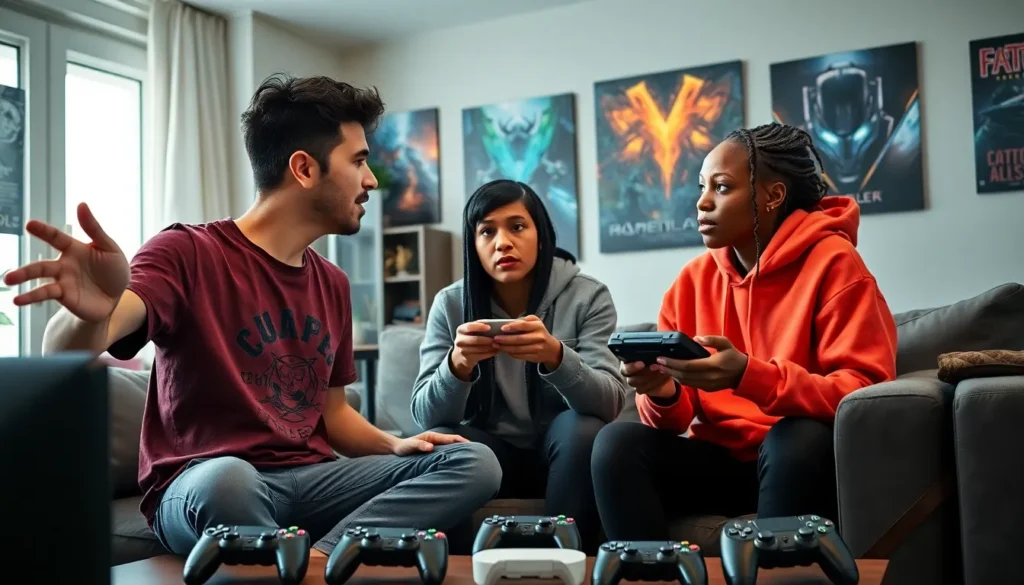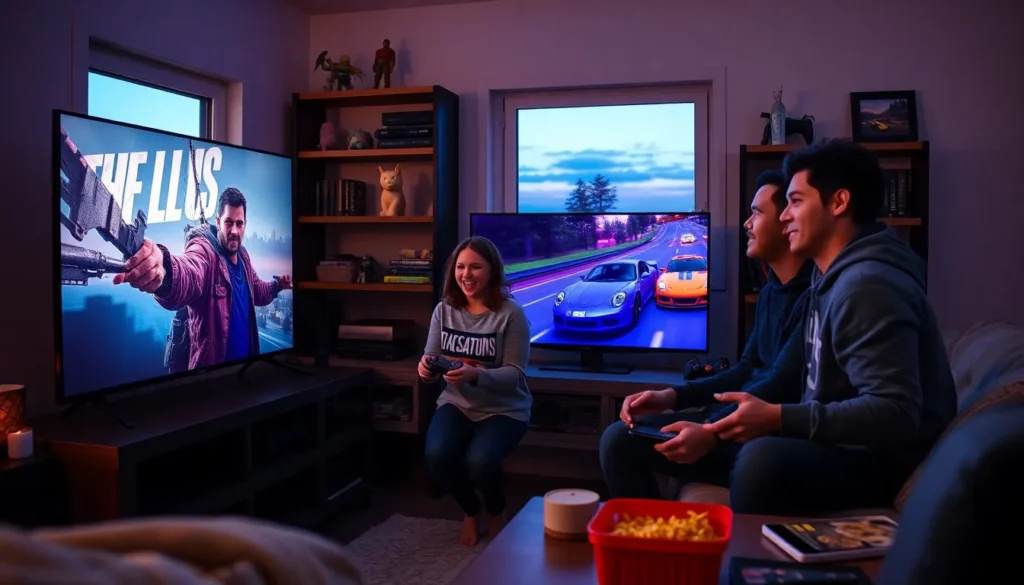Table of Contents
ToggleIn the world of gaming, not every level is a walk in the park. Sometimes, players find themselves facing an unexpected boss battle: gamer backlash events. These moments can turn loyal fans into furious keyboard warriors faster than you can say “microtransaction.” From controversial game updates to the infamous loot box debates, the gaming community has a knack for igniting flames of discontent that spread like wildfire across forums and social media.
Overview of Gamer Backlash Events
Gamer backlash events arise from a variety of issues within the gaming community. Controversial updates frequently spark anger among dedicated fans. Loot box controversies stand out as a primary trigger for discontent, leading to heightened discussions on social media platforms and gaming forums. Examples, such as the backlash over “Star Wars Battlefront II,” illustrate how aggressive monetization strategies can alienate loyal supporters.
Responses often escalate quickly, with heated exchanges occurring in online communities. Players voice concerns over game development decisions that seem to prioritize profit over quality. Following controversial announcements, developers may face significant scrutiny from the community. Titles with perceived flaws, such as excessive microtransactions, encounter swift backlash, affecting their reputation and sales.
Occasionally, backlash leads to publisher responses, including retractions or adjustments to content. Games like “Cyberpunk 2077” saw developers addressing player complaints as a method to restore trust. Critical community feedback shifts the focus of future updates and shapes game direction. The impact of player sentiment on game development is evident, as developers aim to restore goodwill.
Analyzing these events reveals broader trends within the industry. Gamers increasingly demand transparency and accountability from studios. As the landscape evolves, the influence of backlash events on gaming culture becomes undeniable. Long-term implications affect how future titles are developed and marketed.
Historical Context of Gamer Backlash

Gamer backlash has evolved significantly over the years, shaped by various incidents and trends within the industry. It stems from frustrations over game design, monetization strategies, and developer transparency.
Early Incidents
Notable early incidents mark the beginning of gamer backlash. The launch of “Diablo III” in 2012 sparked outrage due to its always-online requirement, frustrating fans who expected a single-player experience. “No Man’s Sky,” released in 2016, faced similar backlash as players criticized the disparity between promised features and the final product. These events highlighted gamers’ demands for quality and fulfillment of expectations, setting a precedent for future reactions.
Evolution Over Time
Backlash evolved with technological advancements and the rise of social media platforms. Gamers became more vocal, utilizing forums and sites like Twitter to express dissatisfaction rapidly. The controversies surrounding “Star Wars Battlefront II” in 2017 exemplified how widespread discontent can arise from aggressive monetization. Companies reacted to this increasing scrutiny by adjusting policies and enhancing communication with players. Overall, this evolution emphasizes a growing demand for accountability and transparency in game development.
Major Gamer Backlash Events
Gamer backlash events often grab headlines and shape discussions in the gaming community. These occurrences highlight the tensions between developers and players over game quality and monetization.
Event 1: The Fallout 76 Controversy
Fallout 76 faced significant backlash following its 2018 launch. Players criticized the game for numerous technical issues and lack of content, leading to a negative reception. Quest bugs, empty worlds, and missing features fueled anger, prompting fans to express their dissatisfaction on social media platforms. Bethesda’s poor communication further exacerbated the situation. In response, the company attempted damage control by issuing patches and providing free content updates. Despite these efforts, player trust took a considerable hit, impacting future releases.
Event 2: The Star Wars Battlefront II Backlash
Star Wars Battlefront II became infamous for its loot box system in 2017. Fans reacted strongly against the game’s monetization practices, which many perceived as pay-to-win. The uproar gained momentum when players learned that essential characters required extensive gameplay or additional purchases. This outcry drew significant media attention, leading to an unprecedented response from EA. The company announced changes to the loot box system, temporarily disabling microtransactions. Ultimately, Star Wars Battlefront II’s controversy exemplified how aggressive monetization strategies can lead to widespread player backlash.
Causes of Gamer Backlash
Gamer backlash stems from several interconnected issues that resonate deeply within the community. Players often respond passionately when they perceive that their interests are compromised.
Community Dynamics
Loyalty to franchises can rapidly transform into discontent when updates clash with player expectations. Trust erodes quickly if developers prioritize monetization over gameplay quality. Just as community voices amplify shared concerns, social media serves as a catalyst for discontent, enabling players to unite against controversial changes. Players express grievances about perceived injustices, and discussions extend across various platforms. Developers face immediate scrutiny when failing to address issues, leading to a cycle of feedback and retaliation. Past experiences with titles like “Fallout 76” illustrate how community sentiment directly affects developer reputation and future releases.
Industry Influence
Corporate strategies directly impact player sentiment and reaction. Aggressive monetization methods, such as loot boxes, can alienate fans, prompting swift backlash. Observations from “Star Wars Battlefront II” reveal how industry practices can spark significant community outrage. Players demand transparency, and their expectations continue to shape game development. Companies must adapt to this feedback, balancing profit motives with community satisfaction. Historical trends demonstrate that remaining responsive to player concerns leads to healthier relationships between developers and enthusiasts. Engagement can foster loyalty, but ignoring community voices risks long-term damage.
Impact of Gamer Backlash Events
Gamer backlash events significantly affect both the industry and community. Various incidents illustrate the repercussions of unmet expectations and perceived corporate greed.
On Game Development
Game development faces direct consequences from backlash events. Developers often adjust their strategies following player criticism, illustrating a shift toward more player-centric approaches. Titles deemed problematic frequently undergo significant revisions based on community feedback. The launch of “Cyberpunk 2077” exemplifies this approach, as developers made substantial updates to earn back player trust. Swift corrections can preserve a game’s reputation and improve long-term loyalty. Staying responsive to fan concerns promotes an overall healthier gaming environment. Studios become aware that prioritizing quality over aggressive monetization fosters positive relationships with players.
On Community Relations
Community relations experience strain during backlash events. Discontent among fans can transform loyal supporters into vocal critics, leading to a widespread loss of trust. Social media platforms amplify player sentiment, allowing grievances to spread rapidly across networks. Players uniting against controversial changes demonstrate the power of collective voices. Developers who prioritize transparent communication often reap the rewards of strengthened community ties. Engaging with feedback builds genuine connections with the audience, essential for long-term success. Understanding player sentiment allows studios to navigate backlash events effectively and maintain valuable relationships.
Gamer backlash events highlight the delicate balance between player expectations and developer decisions. As the gaming landscape evolves, understanding the root causes of discontent becomes crucial for studios aiming to maintain trust. The swift nature of social media amplifies player voices, making it essential for developers to prioritize transparency and responsiveness.
By addressing community concerns and adapting to feedback, studios can not only mitigate backlash but also foster stronger relationships with their audience. This dynamic between gamers and developers shapes the future of the industry, emphasizing the need for quality and accountability in game development. Ultimately, the impact of these events serves as a reminder that player sentiment is a powerful force within the gaming community.







